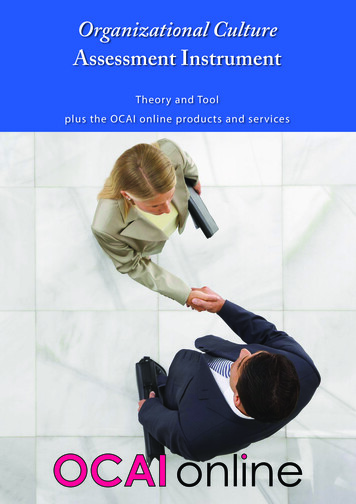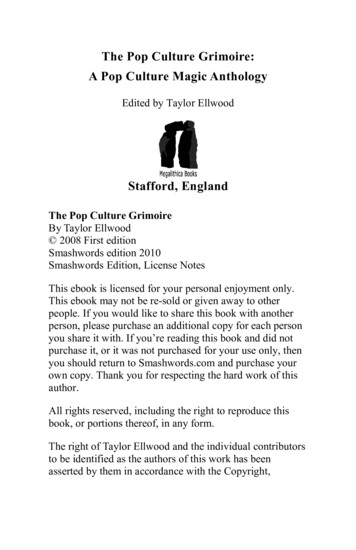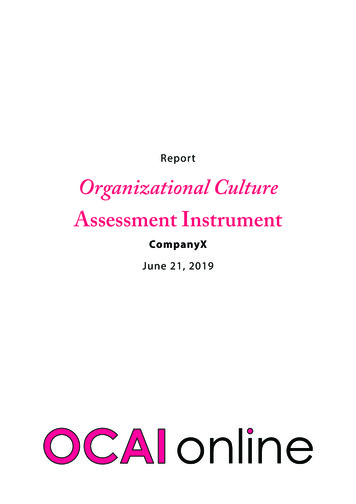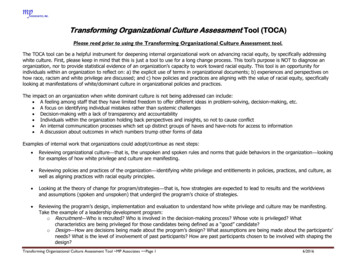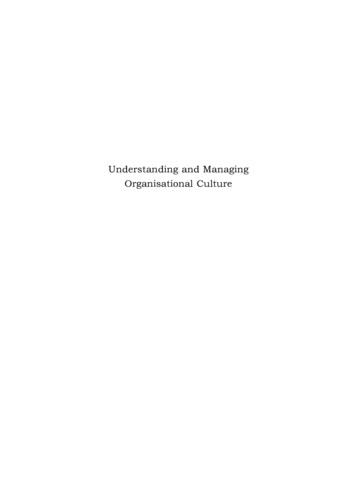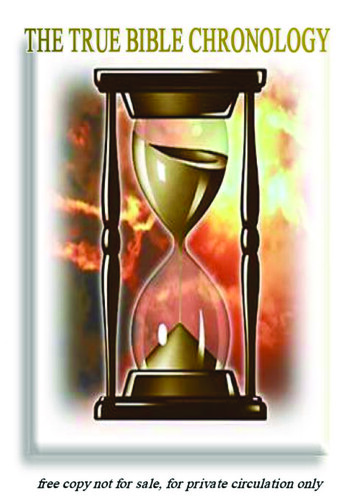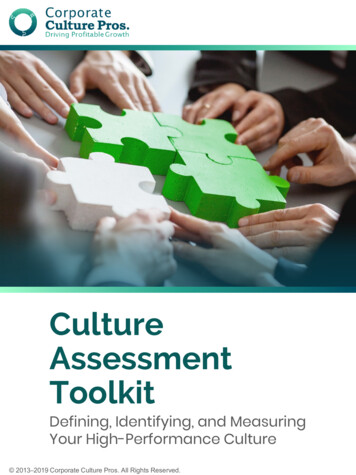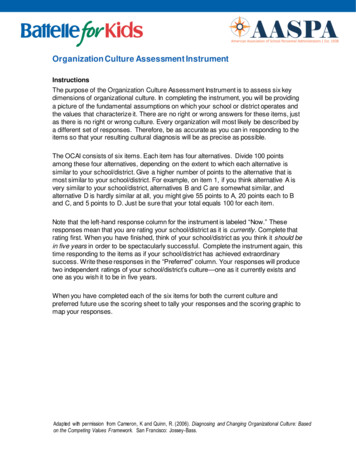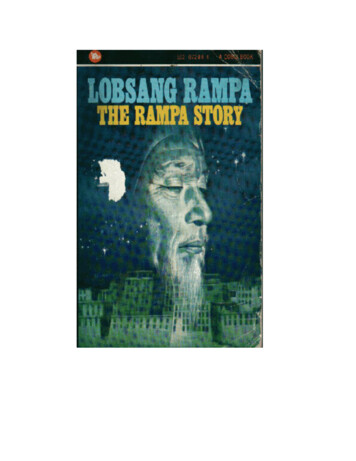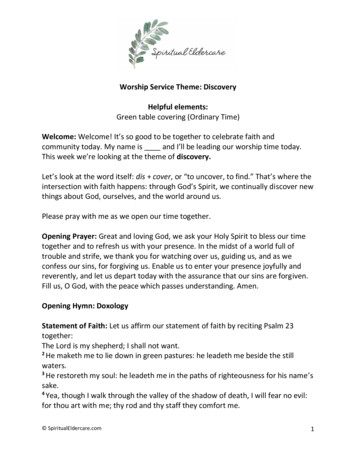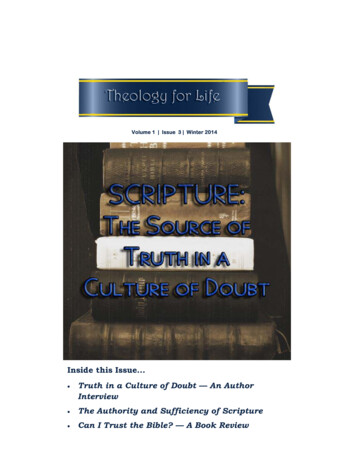
Transcription
Inside this Issue. Truth in a Culture of Doubt — An AuthorInterview The Authority and Sufficiency of Scripture Can I Trust the Bible? — A Book Review
Page 2
Bibliology: The Study of Truth in a Culture of DoubtPage 3Table of Contents Editor’s CornerPage 4By Dave Jenkins Can I Trust the Bible?(Book Review)Page 6By Michael Boling Truth in a Culture of Doubt—An Author Interview with JoshChatrawPage 9By Dave Jenkins From the Mouth of God:Trusting, Reading, andApplying the Bible(Book Review)Page 12By Dave Jenkins Spurgeon, Inerrancy, andWhat We Still Need TodayPage 14By Dave Jenkins The Authority and Sufficiencyof ScripturePage 18By Michael Boling Our Redemptive History: AnExpose on Luke 24:13-27By Dave JenkinsPage 24
Page 4Editor’s CornerEXECUTIVE EDITORDave JenkinsSTAFF EDITORSSarah JenkinsCraig HurstBrian CosbyMike BolingDESIGN DIRECTOR& COPY EDITORSarah JenkinsADVERTISINGTo advertise inTheology for LifeMagazine, emaildave@servantsofgrace.orgCOPYRIGHT Theology for LifeMagazine grantspermission for anyoriginal article tobe quoted, providedTheology for Life iscited as the source.For use of an entirearticle, permissionmust be granted.Please contactdave@servantsofgrace.org.Over the past decade, I’ve spent considerable timestudying the Bible in both an academic and personal setting. During this time, I not only learned a great dealabout the Bible, but also about how the Bible is under attack through a multifaceted method from the scientificcommunities, theological liberalism, and secularism.Many people come to the Bible to merely investigate whatit teaches, rather than to humbly submit to what it teaches. As I continued to study secular history and church history, I quickly realized that these attacks are not new, butrather a common reoccurrence throughout time—albeitwith a new spin and a fresh face attached to them.When I progressed past the scrawny middle-schoolerstage, I became very interested in studying doctrine andtheology. As I continued to study the Bible into adulthood,I came to the conclusion that when a person views the Bible in the wrong light it affects the conclusions that he orshe comes to regarding the person and work of JesusChrist.During the Protestant Reformation, the Reformers returned to the Scriptures. Theologians call this return SolaScriptura which means “Scripture Alone”. By their understanding of Sola Scriptura, the Reformers believed the Bible was inspired, inerrant, authoritative, and sufficientfor training and equipping in the Word of God as Christians practicing their faith.In this issue of Theology for Life on the Bible, you’lllearn from me and our other contributors about the doctrine of Scripture—precisely how the Bible is the inspired,inerrant, sufficient and authorative Word of God. Not only this, but you’ll also read reviews of current books onScripture and an interview from Dr. Chatraw, co-authorwith Drs. Bock and Kostenberger of Truth Matters andTruth in a Culture of Doubt. As you read this Issue, ourprayer is that the Lord would help you to grow inknowledge of handling His Word and applying it so thatyou won’t be merely a hearer of the Word, but a doer ofHis Word by His grace. My hope is that the Bible wouldbecome more precious to you, so much so that you would
Bibliology: The Study of Truth in a Culture of DoubtPage 5delight to digest the Word of the Lord, in the Bible. This is our prayer for you:“Oh, that you and I might get into the very heart of the Word ofGod, and get that Word into ourselves! As I have seen the silkworm eatinto the leaf, and consume it, so ought we to do with the Word of theLord—not crawl over its surface, but eat right into it till we have taken itinto our inmost parts. It is idle merely to let the eye glance over thewords, or to recollect the poetical expressions, or the historic facts; butit is blessed to eat into the very soul of the Bible until, at last, you cometo talk in Scriptural language, and your very style is fashioned uponScripture models, and, what is better still, your spirit is flavored withthe words of the Lord. I would quote John Bunyan as an instance ofwhat I mean. Read anything of his, and you will see that it is almostlike the reading the Bible itself. He had read it till his very soul was saturated with Scripture; and, though his writings are charmingly full ofpoetry, yet he cannot give us his Pilgrim’s Progress—that sweetest ofall prose poems — without continually making us feel and say, “Why,this man is a living Bible!” Prick him anywhere—his blood is Bibline, thevery essence of the Bible flows from him. He cannot speak withoutquoting a text, for his very soul is full of the Word of God. I commendhis example to you, beloved.”In Christ Alone,Dave JenkinsExecutive Editor of Theology for Life Magazine
Page 6A Book Review:Can I Trust the Bible?By Michael BolingThe authority, inspiration,and inerrancyof Scripturehave long beena source ofcontention.Some attemptto treat Scripture as an important document withoutrecognizing itas the Word ofGod, the revelation of the Creator to His people. Stillothers affirm the authority of Scripture onall matters of life, the Sola Scripture or“Scripture Alone” approach. In book two ofthe Crucial Questions series titled, Can ITrust the Bible?, Dr. R. C. Sproul providesa historical and theological look at why wecan place our full faith and trust in God’sWord.This book begins by providing thereader with an in-depth look at the Chicago Statement on Biblical Inerrancy, a document arguably most layman have not hadmuch interaction with, which is rather unfortunate. This document was developedas a means to address the issue of inerrancy, providing a number of biblicallyrooted statements affirming the veracity ofScripture, and most importantly, to“counter the drift from this important doctrinal foundation by significant segmentsof evangelism and the outright denial of itby other church movements.” I waspleased to see the inclusion of this document in this book, as it does meet head-onthe charges made by the likes of BartEhrman and other recent critics of theperspicuity and inerrancy of Scripture.The Chicago Statement is admittedly heavyon theological language, but neverthelessit is an important statement of faith allbelievers should read and be aware of, given the magnitude of this issue.The remainder of Can I Trust theBible, Dr. Sproul addresses six key areasfor which the inerrancy of Scripture impacts: namely, the authority of Scripture;God’s revelation to His people throughScripture; the inspiration of Scripture;biblical inerrancy; the truth of Scripture;and concluding“Since Jesus is in fact God (as Hethe bookclaims), His words carry supremewith howauthority in the lives of Hisall this apcrea on.”plies to thelife of thebeliever.Dr. Sproul aptly notes, “Theauthority of the Bible is based on the factthat it is the written word of God.” When apassage such as 2 Timothy 3:16-17 declares, “All Scripture is God-breathed andis useful for teaching, rebuking, correcting
Bibliology: The Study of Truth in a Culture of Doubtand training in righteousness, so that theservant of God may be thoroughlyequipped for every good work”, we canhave confidence in that fact. The wordsfound in Scripture are indeed Godbreathed, which is what the word inspiredliterally means. Since Jesus is in fact God(as He claims), His words carry supremeauthority in the lives of His creation. However, as Sproul rightly notes, some havegone the route of affirming other documents or church tradition as carryingequal weight to or as supplemental guidance for the believer over and above thedivine oracles of God. This means that forsome, guidance on how to love God andlove others can come from a source otherthan the law of God found in Scripture.Such an approach is dangerous as it places the authority for one’s life somewhereelse, other than in the pages of God’s divine Word. Sproul does an excellent job ofinteracting with the section of the ChicagoStatement that addresses the authority ofthe Bible, clearly highlighting the variousreasons why Scripture is the authorityand source of truth, with a focus on discussing the term sola scriptura—what theterm means, and how it is applied in theChicago Statement.In response to neoorthodox theology, the issue ofScripture being the revelation of God isalso addressed in the Chicago Statement.Biblical scholars, such as Emil Brunner,have stated that Scripture is not revelationunless there is some type of inward connection made with the Bible by the reader.Essentially, he views it as simply a witnessto Christ rather than the God-breathed,revelation of truth from God to His creation. Sproul addresses this false approachby stating, “ [the Bible] embodies truththat comes to us from beyond the scope ofPage 7our own abilities. It comes from God Himself.” This statement aptly reiterates theprevious section on authority. Since Scripture comes from God Himself, it is beyondthe production of human thought or somemystical inward connection. Any connection comes from the work of the Holy Spirit writing God’s word on the heart of thebeliever. Sproul goes on to clearly explainhow God used human authors, and thusthe context of language by which His wordwas revealed. Many have attacked the inerrancy of the Bible due to the use of human conduits, given that man is quiteclearly imperfect andtherefore“God’s word [is].nothing shortmust haveof being God‐breathed.”causedsome imperfections as aresult. Sproul saliently blasts such an approach remarking, “Because of divine inspiration and the superintendence of theHoly Spirit in the giving of sacred Scripture, the writings of the Bible are free fromthe normal tendencies and propensities offallen man to distort the truth.” In essence, God was fully in control of thetransmission of His word, which again relates back to it being God-breathed.Since God’s word has been assessed as being nothing short of being theGod-breathed, inspired Word of AlmightyGod, it can be asserted that within thepages of Scripture exists the source oftruth. This is a rather huge element to understand and Sproul does a marvelous jobof reiterating the necessity to look toScripture for truth and as God’s instructions for righteous living. He appropriatelystates, “[We can affirm] the Bible is completely true, that all its affirmations anddenials correspond with reality.” Thismeans the entirety of the Word of God is
Page 8the very thing 2 Timothy 3:16-17 says. So beyond this being just a discussion of thenerdy theological term inerrancy, in truth (no pun intended), such a book means littleif the truth of inerrancy is not brought home to the reader. I fully appreciated Sproul’sdedication to ensuring the reader is left with the means for application of the principles and statements he has provided throughout this book. He ends his book with asobering statement, one that is absolutely true:“When the Church loses its confidence in the authority of sacred Scripture, it inevitably looks to human opinion as its guiding light. When that happens, the purity of the church is direly threatened.”Can I Trust the Bible is an excellent little book, chock-full of information, including plenty of useful tidbits of application. Those wanting a handyguide to what inerrancy is, and why it matters, will find Sproul’s effort to be well worththeir time. It systematically destroys the arguments of those who have attempted totreat Scripture as nothing more than a set of moral writings, while at the same timeslifts God’s Word to its proper place, that of the inspired, inerrant, infallible, and HolyWord of God.Mike Boling lives in Belleville, IL, with his wife and daughter. He is the Associate Editor for Servants of Grace Ministries and also serves as the Director for Christian Apologetics and Intelligence Ministry.
Bibliology: The Study of Truth in a Culture of DoubtPage 9Truth in a Culture of Doubt - AuthorInterview with Josh ChatrawBy Dave JenkinsJoshua Chatraw serves at Liberty University as thedirector for the Center for Apologetics & CulturalEngagement as well as the director for the Theologyand Apologetics programs in the School of Religion.He is a fellow with the Center for Pastor Theologiansand a member of the Evangelical Theological Society, Institute for Biblical Research, and Society ofBiblical Literature. Chatraw has served in pastoralministry and continues to speak at churches, nonprofit ministries, and colleges both in the UnitedStates and around the world.T4L: Thank you for allowing us to interview you! Yourco-authored book, Truth Matters: Confident Faith in aConfusing World has been the source of great interest inthe Evangelical Church. Can you tell us what inspiredyou and your fellow co-authors (Dr. Darrell Bock andDr. Andreas J. Kostenberger) to write this book andthe accompanying book, Truth in a Culture of Doubt?Josh Chatraw: Many people are being told one half ofthe story concerning the Bible; we felt it was important to write books with a couple ofdifferent audiences in mind to tell the other half of the story. Unfortunately, this “otherhalf of the story”, concerning why the Bible can be trusted, is often not even told in ourchurches! The church has too often left the tough historical (and theological) questionsabout the Bible out of their discipleship programs. I can remember going off to a statecollege and being taught by my skeptical college professor all the problems in the Bibleand issues in its formation.I can remember becoming disillusioned, thinking, “I’ve grown up in the church allmy life, and it’s the first time I‘ve even heard these questions posed. Why am I notequipped to answer these? Are there even reasonable answers?” This doesn’t have tohappen. We have written these books so that it will happen far less often.T4L: Who is Bart Ehrman, and why are his books so popular?Josh Chatraw: I began reading Bart Ehrman’s books shortly after his first New
Page 10York Times Best Seller, Misquoting Jesus.Since then, I have read his works quite extensively. Ehrman is a rare find, an established biblical scholar with the ability towinsomely communicate academic work toa popular audience.Bart Ehrman? What advice do you havefor Pastors (and other church elders) ministering to those struggling with doubtand/or heavily influenced by Ehrman’sfalse teachings (and others like him)?Josh Chatraw: Christian leadershave to be students themselves. Even ifthey don’t have struggles over particularchallenges to Christianity, they have to bein position to help those who do. This ishard work, but it’s vital. It’s part of the sacrifice of pastoral ministry – we not onlyhave to deal with any of our questions anddoubts, we also have to deal with thedoubts and questions of others. However,we can’t love others effectively if we can’tJosh Chatraw: Truth Matters is anhelp them work through their doubts.introduction to the issues raised by BartMoreover, often the people weEhrman and other critical scholars aimed atteenagers, college students, and their parare ministering to aren’t aware of theents. In Truth Matters we have restrained questions they will need answered. Partourselves from including too many footnotes of faithful ministry is about figuring outand have tried to speak to our target audi- how to get people to take the medicine – orence in a way they can understand andperhaps better, the probiotic – that they willneed to keep them from catching somethingrelate.later on. For example, when I was a stuIn Truth in a Culture of Doubt wedent pastor, most of my kids were not dygo deeper and take a closer look at Barting for me to explain textual criticism –Ehrman and his arguments. We includecheck that, none of them were dying to hearmore of a "paper trail" through our footnotesabout it. However, they will likely hearfor pastors, students, and ministry leadersabout it from a skeptic in college, the interwho want to track down more of the spenet, or on the history channel. So, I bettercialized research. Also, we have arrangedfigure out a creative way to introduce it tothis book around specific claims that Ehrthem if I want to prepare them for the worldman makes. We then provide a response toout there – things can be dangerous wheneach one of his claims. This arrangementyou leave “the Shire” and my job as a pasmakes Truth in a Culture of Doubt usefultor is to make sure they are ready for whatin the months and years after initial readmight be waiting for them on their journey.ing in that readers can use the guide in theT4L: How can pastors/churchesback to track down the specific skepticalequip their people apologetically, and helpclaim they are hearing and read our rethem understand the importance of Biblisponse.cal apologetics?T4L: How do you think ChristiansJosh Chatraw: Rather than viewingcan best help those struggling with doubtapologetics as some ivory tower exercise ordue to being influenced by writers likeT4L: The three of you (Bock, Chaltraw, and Kostenberger) co-authored TruthMatters: Confident Faith in a ConfusingWorld and then followed it up with Truth ina Culture of Doubt. Can you help us understand who your target audiences were foreach of these books (laymen or scholars?),and if you have a different purpose foreach?
Bibliology: The Study of Truth in a Culture of DoubtPage 11a staged debate where two intellectuals viciously argue, I encourage people to view apologetics as a way to love their neighbors. We love our neighbors by actually engagingthem in conversation and listening. As Christians we must learn to be better listeners,asking, “What problems does this person have with Christianity?” Then perhaps we canhelp the person work through his/her issues. Pastors can model this approach and evenincorporate it in to sections of their sermons.Dave Jenkins is the Executive Editor of Theology for Life Magazine and serves faithfully at Ustick Baptist Church, in Boise, ID.
Page 12A Book Review:From The Mouth of God: Trusting,Reading, and Applying the BibleBy Dave Jenkinsis needed is a solid primer that will helpChristians understand the nature of theBible. Thankfully such a book now exists:From the Mouth of God: Trusting, Reading,and Applying the Bible by Dr. Sinclair Ferguson.The book has three parts: in thefirst part, spanning the first three chapters, the author looks at trusting the Bible. In the second part, the author helpstruthfulness,his readers understand how the Bible hasand sufficienone story pointing to Jesus Christ. And incy of Scripthe third part, Dr. Ferguson helps readersture. Duringapply the Biblical principles to their everythe 1970s,day lives. The book has four appendixesmen andby a variety of authors, such as Johnwomen gathMurray on the Guidance of the Holy Spirit,ered and wrote up what is now known asJohn Newton on divine guidance, a biblithe Chicago Statement on Inerrancy. Thisography for further reading, and lastly ais now the standard statement on the docBibletrine of Scripture, and is considered thereadingauthorative statement among conservativeplan.“.he explains when the Bibleevangelicals. While attacks on the Biblecame into existence.”are nothing new, an old problem that hasrecently resurrected is that of biblical illiteracy. Given the rise of attacks on the Bible, including skepticism about its truthFrom the Mouth of God is a veryfulness, joined with biblical illiteracy, what readable and helpful book. Many books inRecenttimes havebeen witness to therise of attacks onthe authority,
Bibliology: The Study of Truth in a Culture of Doubtthis genre are overly academic, and thuslose most readers with their technical jargon; this is not the case with this book.Dr. Ferguson is a gifted writer and teacher; he will help each reader understandnot only what the Bible is, but also its importance for the daily Christian life. In addition, he guides his audience throughunderstanding the central storyline of theBible and applying the Bible to one’s ownlife. Along the way he explains when theBible came into existence, the inerrancy ofScripture, what Christians need to learnin order to understand it better, and whythe Bible’s teaching changes people’s lives.For this and many others reasons, I highlyrecommend From the Mouth of God: Trusting, Reading, and Applying the Bible.Page 13the doctrine of Scripture published todate. So if you’re interested in the doctrineof Scripture and wondering which bookyou should pick up, do yourself a fa-vor right now and go pick up acopy of From the Mouth of God:Trusting, Reading, and Applyingthe Bible, by Dr. Sinclair Ferguson.This book is perfect, not onlyfor the lay Christian, but even for the mostwell-read scholar on the doctrine of Scripture. This book does all the things onewould expect a book written at the popular level to do—namely to be accessible,easy to understand, and helpfully demonstrate how to put into practice spiritualdisciplines within the reader’s own life.From the Mouth of God is one of the finestpopular-level books I’ve read on the doctrine of Scripture. While the book’s goalsaren’t centered around examining theapologetic attacks on the Bible, Dr. Ferguson’s aim is simply to introduce the readerto the questions and subsequent answersconcerning the Bible. In this way, the author overwhelmingly succeeds in his purpose in writing one of the best primers onDave Jenkins is the Executive Editor ofTheology for Life and faithfully serves atUstick Baptist Church, in Boise, ID. He andhis wife, Sarah, live near Caldwell, IDwhere they work for Servants of Grace Ministries. Dave loves reading and playing golfas often as he can.
Page 14Spurgeon, Inerrancy, and What WeStill Need TodayBy Dave JenkinsCharlesHaddonSpurgeon’sinfluencetoday isfelt morethan ever,as he is themost published Christian author inchurch history.1 He is often quoted in sermons, articles, books, tweets, and otherquote-worthy mediums among Christians.Helmut Thielicke helpfully points out theimpact and influence of Spurgeon’s ministry when henotes that,“The fire“Spurgeon’s influence is s ll felt Spurgeonkindledtoday in evangelicalism.”turned into abeacon thatshone acrossthe seas and down through generations,was no mere brush fire of sensationalism,but an inexhaustible blaze that glowedand burned on solid hearths and was fedby the wells of the eternal Word. Here wasthe miracle of a brush that burned withfire and yet was not consumed.”2Albert Mohler explains that “thedefining characteristic of Spurgeon’s ministry was an undiluted passion for the exposition and proclamation of God’sWord.”3 Spurgeon’s influence is felt todaybecause he was a man of the people, aman whose infectious love for the LordJesus Christ spilled over into all he wrote,said, and did. Spurgeon’s influence wonhim many friends and many critics, but itis undeniable that his influence is felt onevangelicalism today because of his passionate pursuit of proclaiming the gloryand majesty of Christ in everything hesaid and wrote.Spurgeon’s influence is still felttoday in evangelicalism, because he was aman of conviction. He did not seek aftercontroversy, but rather picked which battles he entered into with great care, onlychoosing to enter into those battles whichcompromised the Christian faith.Spurgeon’s example is instructive toChristian ministry leaders, as many supposed evangelicals today claim to follow inthe line of evangelicalism, but do not havea high view of the Bible. If the story ofChurch history has taught evangelicalsanything it should be that when a highview of Scripture is upheld, then Jesuswill be brought glory. The example ofSpurgeon is especially important in thisregard, since he had a high view of God’sWord and of His Son Jesus Christ. He proclaimed the Word of God in a time when
Bibliology: The Study of Truth in a Culture of Doubttruth was under attack, much like today,but did not compromise.Albert Mohler explains,“Spurgeon was a man, possessed by deeppassion for the Word of God and the Gospel of Jesus Christ.”4 Spurgeon’s passionfor the Word of God and the person of Jesus consumed all of his waking hours.Charles’ conviction to preach the Word ofGod without compromise is needed amongevangelicals today more than ever. In recent times, some voices are calling for a“big-tent evangelicalism” that is more inclusive than exclusive. This is a big mistake; the early church fathers to the16th century Protestant Reformers acrossEurope, and up to the present day conservative evangelicals, have all affirmedverbal plenary inspiration, and biblicalinerrancy.Clement of Rome (A.D. 80100) taught, “You have looked closelyinto the Holy Scriptures, which are giventhrough the Holy Spirit. You know thatnothing unrighteous or falsified has beenwritten in them.” (1 Clement, XLV. 2.3.)Augustine wrote to Jerome (A.D. 394), “Itseems to me that most disastrous consequence to follow upon our believing anything false is found in the sacred books,that is to say, that the men by whom theScriptures have been given to us, andcommitted in writing, did not put down inthese books anything false.” (Cited byJames Olive Buswell, Outlines of Theology,24.) John Calvin thought of Scripture as“the sure and infallible record”, “the unerring standard”, “the pure Word of God”,“the infallible rule of His Holy Truth”, “freefrom every stain or defect”, “the unerringcertainty”, “the certain and unerring rule”,“unerring light”, “infallible Word of God”,“has nothing belonging to man mixed withit”, “inviolable”, and “infallible oracles”.Page 15Inerrancy was the view of Augustine, Luther, and Calvin, as well as of the entireChurch; inerrancy is the “central churchtradition”. (John D. Hannah,ed., Inerrancy and the Church (Chicago:Moody, Press, 1984), ix.) The EvangelicalTheological Society (ETS) was founded in1949 and had a singular doctrinal statement at its founding that affirmed inerrancy: “The Bible alone, and the Bible inits entirety, is the Word of God writtenand is therefore inerrant in the autographs.” (“Evangelical Scholars RemoveRobert Gundry for His Views on Matthew,” Christianity Today, February 3,1984.)At the end of the day, those whowant to redefine evangelicalism and reshape it in their own mold do so at theirown peril.Evangelicalstoday would“Godly men of passion andbe wise toconvic on will be maligned and follow thepersecuted.”example ofSpurgeon,who stood onthe Word of God and called his readers to“read not so much man’s comments, orman’s books, but read the Scriptures, andkeep your faith on this, — “God said it.””13The ministry of Spurgeon is instructive to Christians today becauseSpurgeon was a man aflame with the gloryof the grace of God. Spurgeon made animpact because of his passion for andstance on evangelical truth, which he contended for, defended, and proclaimed withall of his might to the glory of God. Men ofpassion and conviction are needed inevangelicalism today; men who will contend for, defend, and proclaim the truth ofsubstitutionary atonement, the authorityand inspiration of Scripture, eternal punishment for unbelievers, original sin, and
Page 16the absoluteness of Christianity.Godly men of passion and conviction will be maligned and persecuted– aswas Spurgeon and the Church Fathersbefore him—but they must follow the example of Jesus and men like Spurgeonwho modeled for pastors, ministry leaders,and believers how to stand firm in thefaith, once-and-for-all delivered to thesaints. While truth is under attack todayon many fronts inside and outside thechurch, an even greater need and threat isarising from within its ranks, and that isfound in the need of men to stand up andbe counted.contend for, defend, and proclaim to thenations. The Word of God always standsin judgment of men; never do men standin judgment of it. This fact reveals the fundamental problem going on inside andoutside the church by exposing, asSpurgeon knew in his time, that the issues of today are old issues rooted in whois authoritative: God or man. As with everygeneration before and every one after, theTruth of God’s Word will remain authoritative, unchanging, and unrelenting as itseeks to lift high the name and glory ofJesus among the nations.down their swords and accept the lie ofliberalism. While there is much to becommended in recent days in evangelicalism—especially in the growing movementof Christians, ministries and churchesthat are discussing what is the Gospel andits implications—there is still much to bealarmed about as many are questioningand casting aside the authority of theWord of God; either through how they usethe Bible, what they think about Adambeing a historical person, or their stanceon gender roles. This generation of believers will have to decide—as did Spurgeon—if they will stand on the Truth of the Wordof God and lift up the Son of God amongthe nations, or whether they will lay downtheir sword and succumb to false teaching(and the wiles of the devil).edged sword (Hebrews 4:12). The Word ofGod is the means by which God uses HisSpirit to pierce the heart of the convincedatheist, rejecters like Judas, and denierslike Peter. Evangelicals today need tostand firm in the grace of God and theWord by looking to the example of menlike Spurgeon, and be encouraged thatGod by His grace is still working to bringpeople to Himself and build His church forHis glory and praise.As the Word of God did itsEvery generation of believ- work in Spurgeon’s time, so todayers must determine if they areevangelicals can be encouraged that thegoing to stand for biblical truth or lay Word of God is sharper than any twoAt the end of the day,Spurgeon was right: “.believersmust never adjust the Bible to the age,but the age to the Bible.”14 Believers havebeen given the Word of God, not to speculate on, but to study, to mediate upon,References:[1] Eric W. Hayden. “Did You Know: A Collection of True and unusual facts aboutCharles Haddon Spurgeon.” Christian History, 10:1, #29, (February 1991).[2] Helmut Thielicke, Encounter withSpurgeon, tr
As I continued to study the Bible into adulthood, . believer. Dr. Sproul aptly notes, “The authority of the Bible is based on the fact that it is the written word of God.” When a passage such as 2 Timo
